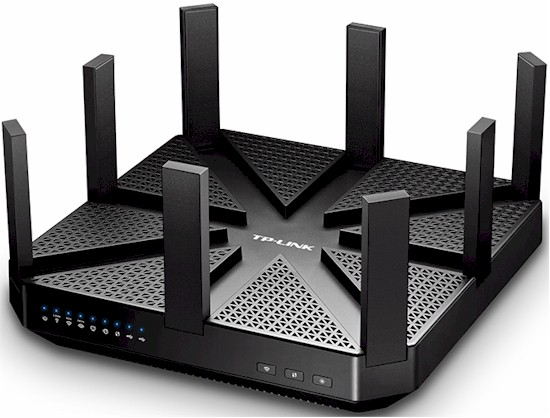
| At a glance | |
|---|---|
| Product | TP-LINK Wireless Tri-Band Gigabit Router (Talon AD7200) [Website] |
| Summary | AC2600 class router with Gigabit Ethernet ports and USB 3.0 storage and printer sharing with 802.11ad 60 GHz band radio |
| Pros | • 11ad works and is easy to use |
| Cons | • 11ad doesn’t reach advertised maximum link rate • Router architecture limits 11ad throughput • 11ad limited to in-room use (line-of-sight) |
Typical Price: $0 Buy From Amazon
Introduction
Updated 12/18/17 – Corrected 60 GHz antenna information
At some point, Wi-Fi marketeers are going to find a way to slap 10,000 on the front of their boxes to suck in Wi-Fi naifs. In the meantime, TP-LINK is the current winner of the big number Wi-Fi sweepstakes with 7200 for its latest offering.
Its official name is Talon AD7200 Multi-Band Wi-Fi Router, diverging from the "Archer" moniker applied to the company’s other AC class products. But don’t let that fool you, because behind those eight antennas is essentially an AC2600 class Archer C2600, with a single-stream 60 GHz 802.11ad radio thrown in to inflate the front-of-box number. (Maximum link rate math works out to 800 Mbps (2.4 GHz) + 1733 Mbps (5 GHz) + 4600 Mbps (60 GHz) = 7133, rounded up to 7200.)
The "AD" part of Talon’s name refers to 802.11ad aka "WiGig", which you can think of as the shotgun marriage of 60 GHz technology and 802.11 Wi-Fi. 60 GHz has been a long time coming to a router near you, taking a meandering path through UltraWideBand, Wireless USB and other now defunct consortiums. 802.11ad promises the ease of use of Wi-Fi for finding and joining networks and securing connection with them, with higher bandwidth—or at least link rates—than currently available with even 4×4 802.11ac Wi-Fi. We’ll see later how this works out in real life.
You would be forgiven is you mistook the AD7200 for TP-LINK’s tri-radio 4×4 AC5400 class Archer C5400, which we haven’t yet tested, or the tri-radio 3×3 AC3200 class Archer C3200, which we have. Both have the same basic design as the Talon, with two fewer antennas on the Archer C3200.
The Talon AD7200’s LEDs and buttons are annotated in the callout diagram below and include a light for each radio, but only one link light for all four Gigabit Ethernet LAN ports. Invidual Ethernet ports have no lights on them either. You get buttons for kick off a WPS session and turn Wi-Fi and all the panel LEDs on and off.
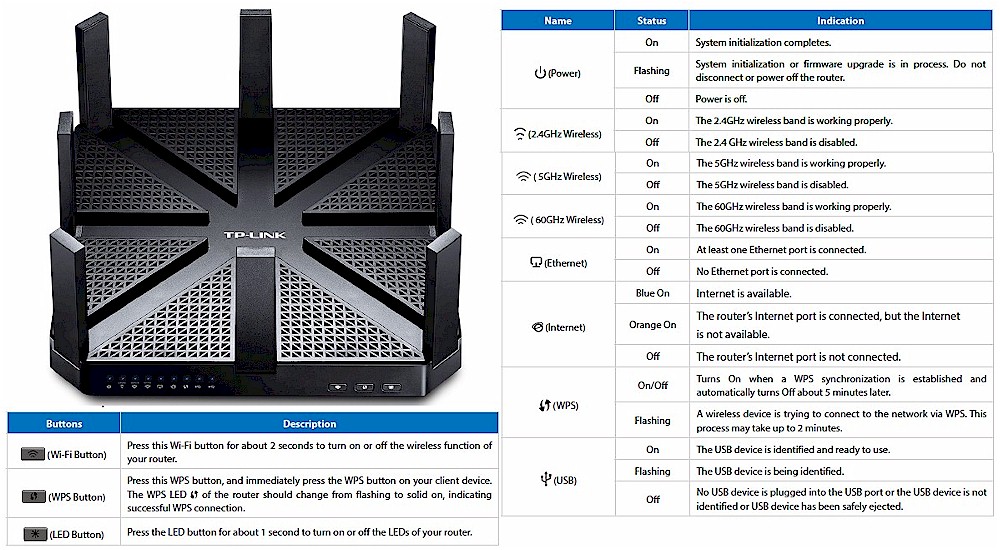
TP-LINK Talon AD7200 LED callouts
The rear panel has the single WAN and four switched Gigabit Ethernet LAN ports, plus two USB 3.0 ports that support storage and printer sharing. There is no USB 2.0 port.
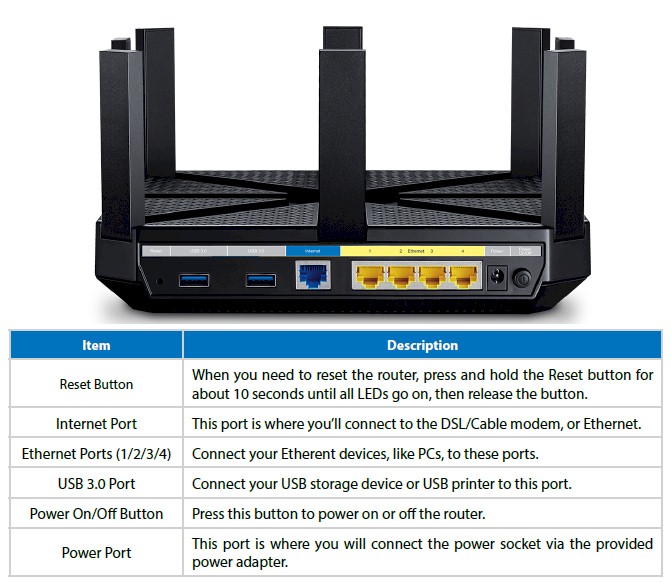
TP-LINK Talon AD7200 rear panel callouts
The bottom and top of the router have plenty of vent slots. There are no vents on the sides. The AD7200 is designed to sit flat on a desk, but can be wall mounted via two bottom-panel screw slots that will orient the rear panel toward the ceiling.
Inside
TP-LINK didn’t put a short-term hold on its FCC ID docs, so I was able to grab some internal photos. After the Archer C3150 review, TP-LINK said they didn’t like the fuzzy FCC photos, so sent a bunch of clearer ones that I swapped in. They did it again, so most of the photos that follow are theirs.
Removing the bottom cover gets you the view in the first photo. No heatsinks were removed. Each Wi-Fi radio gets its own four antennas, with 2.4 and 5 GHz alternating around the perimeter. I think that makes the AD7200 the only AC2600 class router with separate 2.4 and 5 GHz antennas. The 802.11ad 60 GHz radio is at the center, connected to its single antenna via the white cable.
Updated 12/18/17
A helpful reader pointed out that I had incorrectly identified the 60 GHz antenna as the printed circuit board antenna that appears to be connected via the white cable in the photo below. In fact, the 60 GHz antenna is in the front middle foldable antenna. The printed circuit antenna actually belongs to the 2.4 GHz radio.
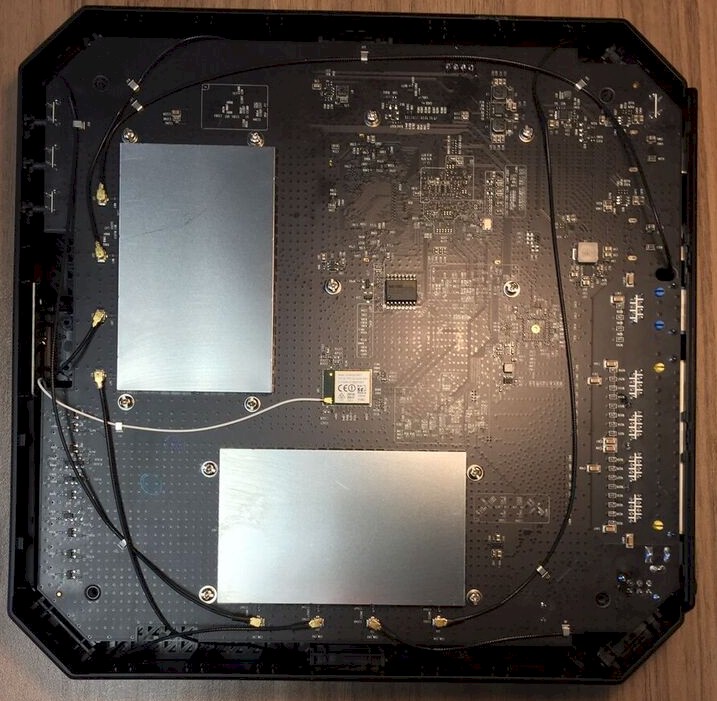
TP-LINK Talon AD7200 board bottom
Using a similar design as the Archer C3150, the heatsinks are on the top of the board.
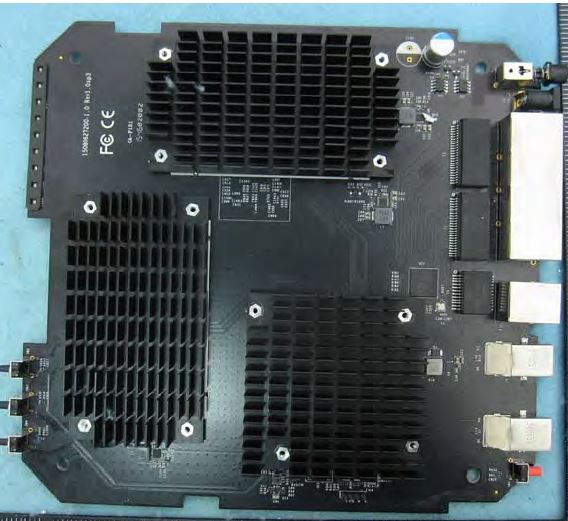
TP-LINK Talon AD7200 board top w/ heatsink
Removing the heatsinks shows no large copper areas to increase heat transfer like the Archer C3150 has. Thermal pads couple the heatsinks directly to the board for the 5 GHz (top) and 2.4 GHz (bottom left) radio circuitry on the board bottom. The Qualcomm dual-core IPQ8064 processor and 512 MB of RAM sit in a RF can that had its top removed for this photo.
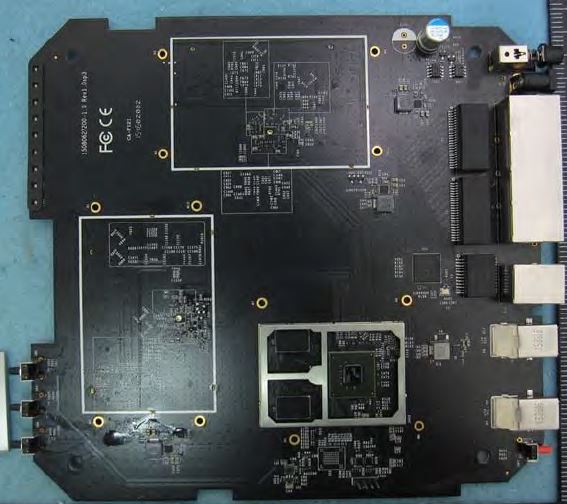
TP-LINK Talon AD7200 board top
Here’s the bottom of the board again with RF can lids removed. The board is rotated 90 degrees from the photo above; 5 GHz radio is to the bottom and 2.4 GHz to the left.
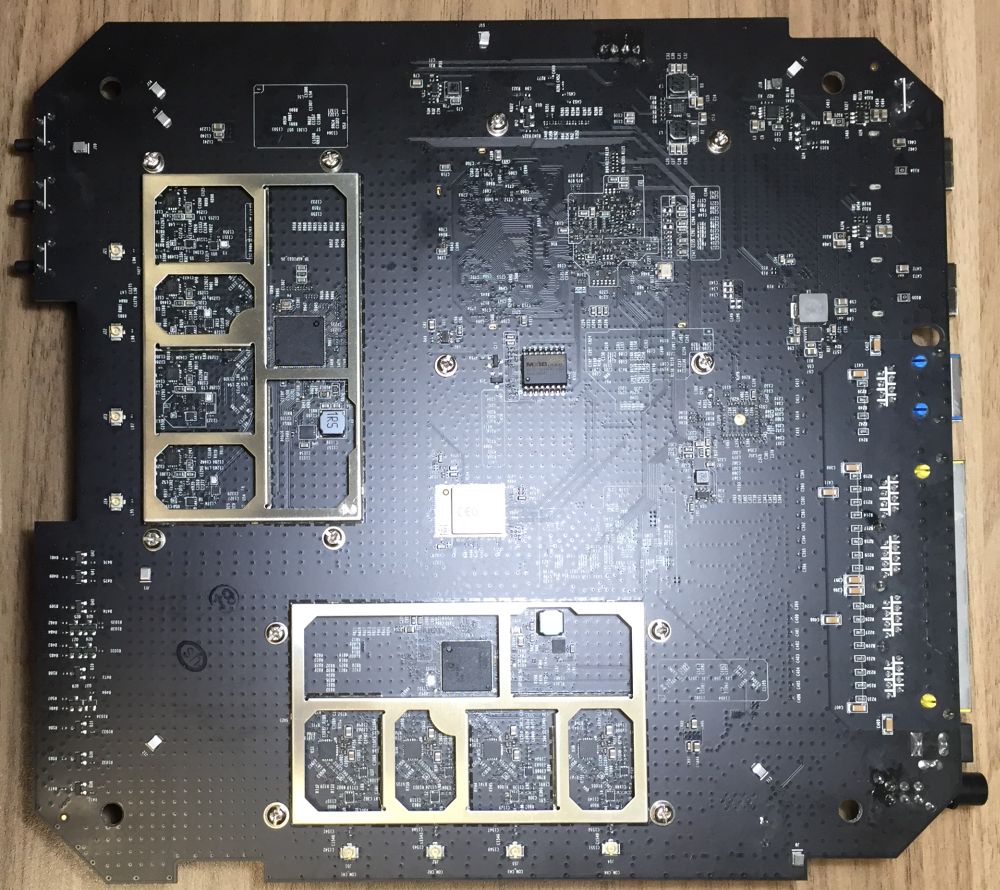
TP-LINK Talon AD7200 bottom view
The AD7200’s key components are in Table 1 along with the Archer C2600’s. The two are pretty much the same design, except for more flash and the 802.11ad radio in the AD7200.
| TP-LINK Talon AD7200 | TP-LINK Archer C2600 | |
|---|---|---|
| CPU | Qualcomm dual-core IPQ8064 Internet Processor @ 1.4 GHz | Qualcomm dual-core IPQ8064 Internet Processor @ 1.4 GHz |
| Switch | Qualcomm Atheros QCA8337 | Qualcomm Atheros QCA8337 |
| RAM | 512 MB | 512 MB |
| Flash | 256 MB | 32 MB |
| 2.4 GHz Radio | – QCA9980 4-stream 802.11ac MU-MIMO radio – Skyworks SE2623L 2.4 GHz power amp (x4) |
– QCA9980 4-stream 802.11ac MU-MIMO radio – Skyworks SE2623L 2.4 GHz power amp (x4) |
| 5 GHz radio | – QCA9980 4-stream 802.11ac MU-MIMO radio – Skyworks SKY85405 5 GHz power amp (x4) |
– QCA9980 4-stream 802.11ac MU-MIMO radio – Skyworks SKY85405 5 GHz power amp (x4) |
| 60 GHz radio | QCA9500 in QCA9008-SBD1 module | N/A |
Table 1: Component summary
Here’s a photo of the Archer C2600 board top for comparison.
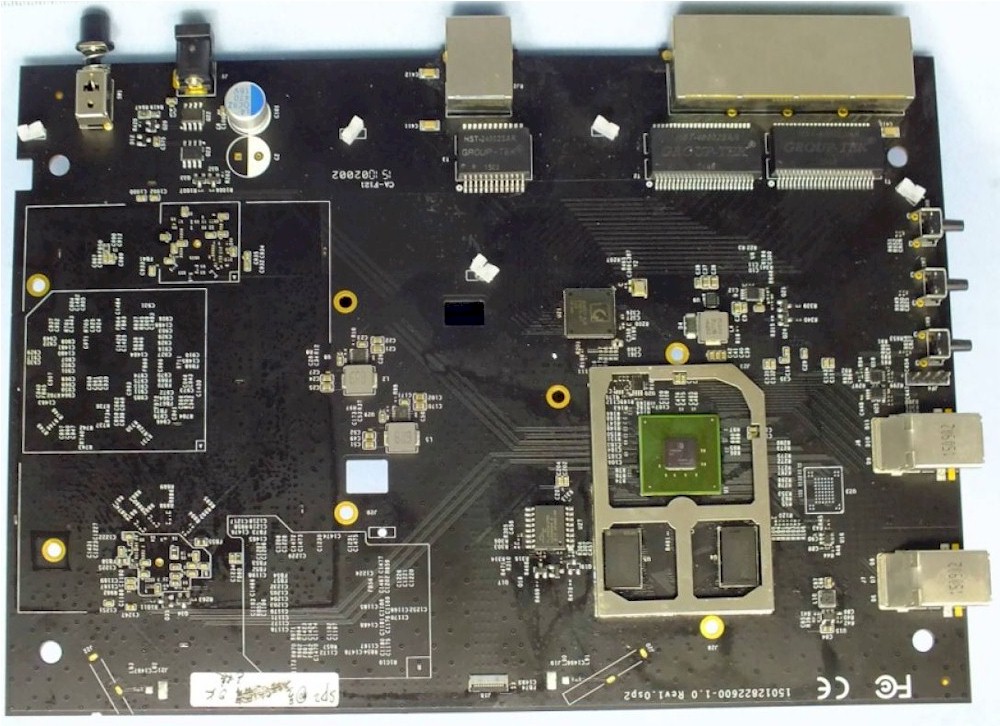
TP-LINK Archer C2600 board top
Features
The AD7200’s admin GUI and feature set is basically the same as the Archer C2600 and C3200. Refer to this summary and use the online emulator to further explore features.
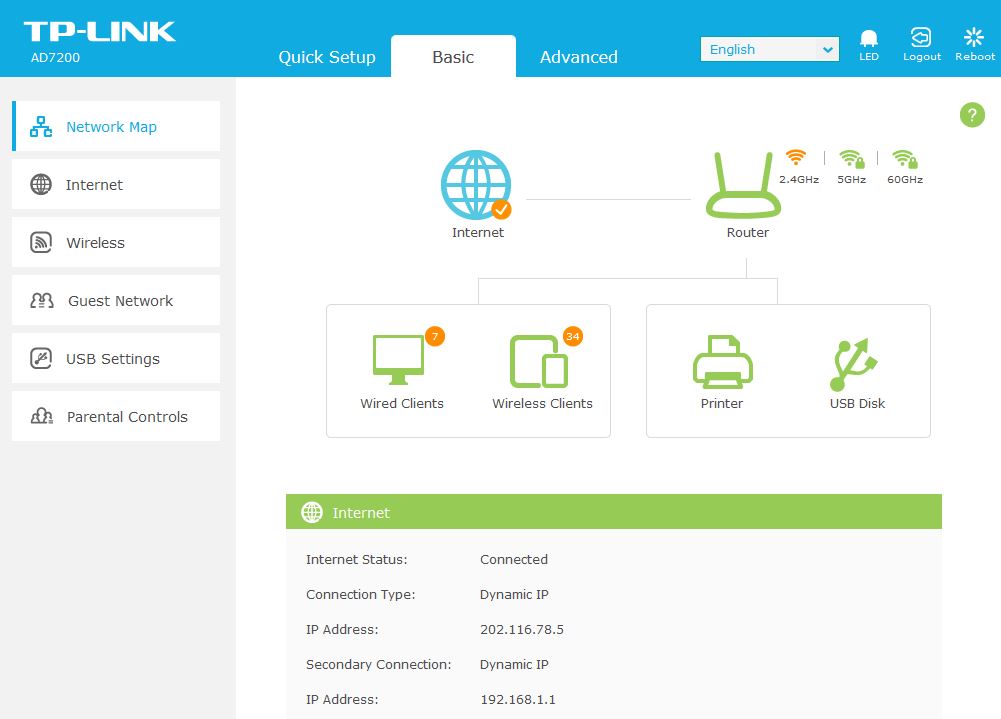
Basic mode status
The screenshot below shows the Advanced > System Tools > System Parameters > Wireless Advanced screen for the 2.4 and 5 GHz radios. Note there is no USB 3.0 Interference Reduction checkbox in the 2.4 GHz settings. The Multi-User MIMO checkbox shouldn’t be shown in the 2.4 GHz screen. TP-LINK confirms it’s a bug and will have no effect on router performance.
Both radios have AP Isolation options, but neither has the Airtime Fairness controls found in the Broadcom-based Archer C3150. On the plus side, WDS-based wireless bridging is supported on both 2.4 and 5 GHz, where it isn’t in the C3150.
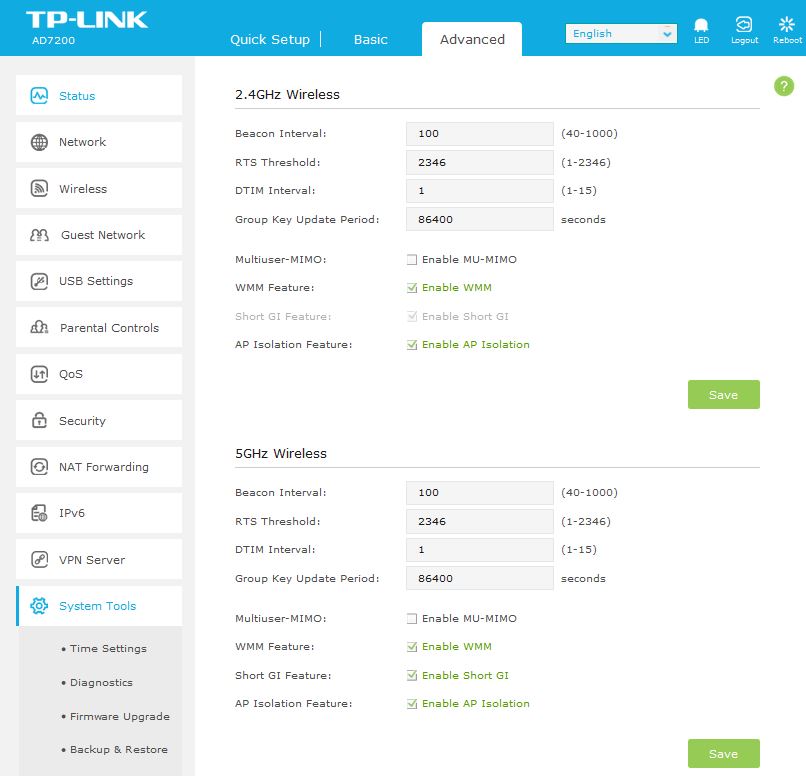
Wireless Advanced settings
For those curious about the 60 GHz radio settings, the two screens related to them are merged into one below. Channel choices are Auto (default), 1, 2 and 3.
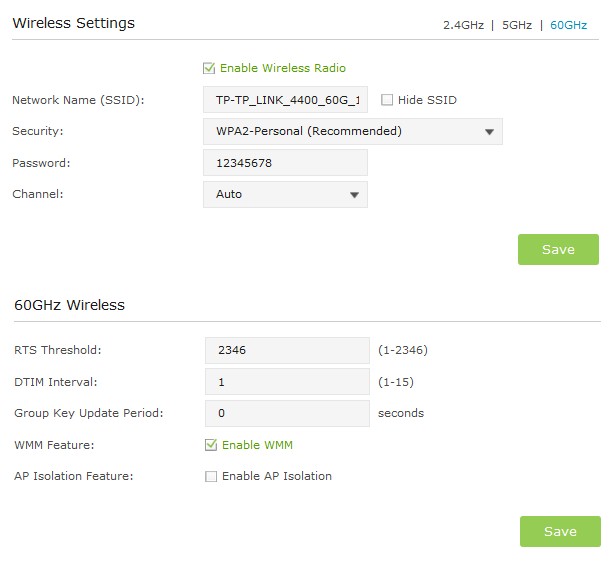
60 GHz radio settings
Storage Performance
The summary graphic below from the Router Charts shows the AD7200 and AC2600 and AC3100 / 3150 class routers we’ve tested with our standard procedure with USB 3.0 connections and NTFS drive format. The AD7200 doesn’t do well, coming in at the bottom of both comparisons.
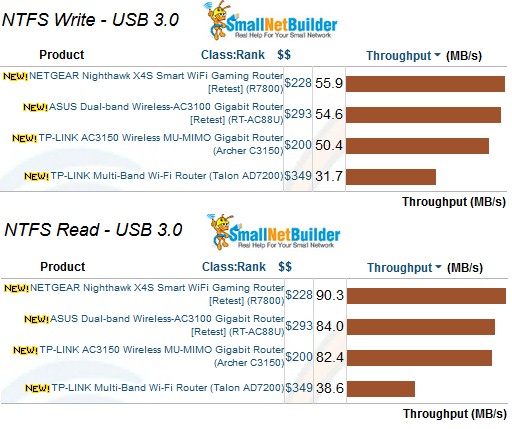
Storage Performance Comparison – USB 3.0 / NTFS
Routing Performance
The Talon AD7200 was loaded with 1.0.9 Build 20160602 rel.37987 firmware and tested with our V4 router test process. You can download an Excel test summary that contains all functional and performance test results.
Table 2 summarizes the performance test results.
| Test Description | TP-LINK Talon AD7200 |
|---|---|
| WAN – LAN TCP (Mbps) | 929 |
| LAN – WAN TCP (Mbps) | 933 |
| Total Simultaneous TCP (Mbps) | 1737 |
| TCP Connection | Pass |
| WAN – LAN UDP (Mbps) | 374 |
| LAN – WAN UDP (Mbps) | 325 |
| Total Simultaneous UDP (Mbps) | 747 |
| UDP Connection | Fail |
| Functional Score (%) | 93.5 |
Table 2: Routing performance comparison
Total Simultaneous TCP/IP and UDP throughput are proving to be better performance differentiators than the unidirectional benchmarks. The highest performer so far for both benchmarks has been D-Link’s DIR-879 AC1900 EXO router at 1850 Mbps and 1900 Mbps for TCP/IP and UDP, respectively. Results for other 4×4 routers are shown in the bar charts below for comparison.
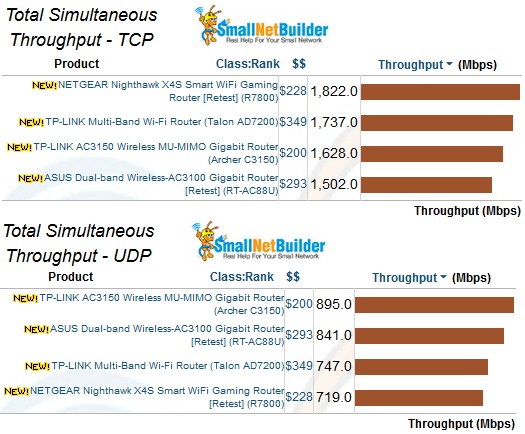
Total Simultaneous throughput comparison
Most products fail the new maximum UDP connection test and pass the TCP connection test and that’s what the AD7200 did.
The Functional Score of 93.5% is quite good, second only to the 95.1% for Linksys’ EA9500 and represents only 16 tests failing out of the 245 in the CDRouter test suite.
The largest group of failed tests were related to how the router’s DNS proxy handles local DHCP server hostnames. Two fails are due to the router not supporting HTTPs admin connections.
On a positive note, the triggered port forwarding tests that fail for most other routers passed for the AD7200. The reason is the router supports mixing of single and port ranges in both the triggering and forwarded port settings.
Wireless Performance
The Talon AD7200 was tested with our Revision 9 wireless test process with 1.0.9 Build 20160602 rel.37987 version firmware loaded. Channel 6 and 20 MHz B/W mode was set for 2.4 GHz and Channel 40 and 80 MHz B/W mode was set for 5 GHz. The router was positioned in the test chamber as shown in the photo below.
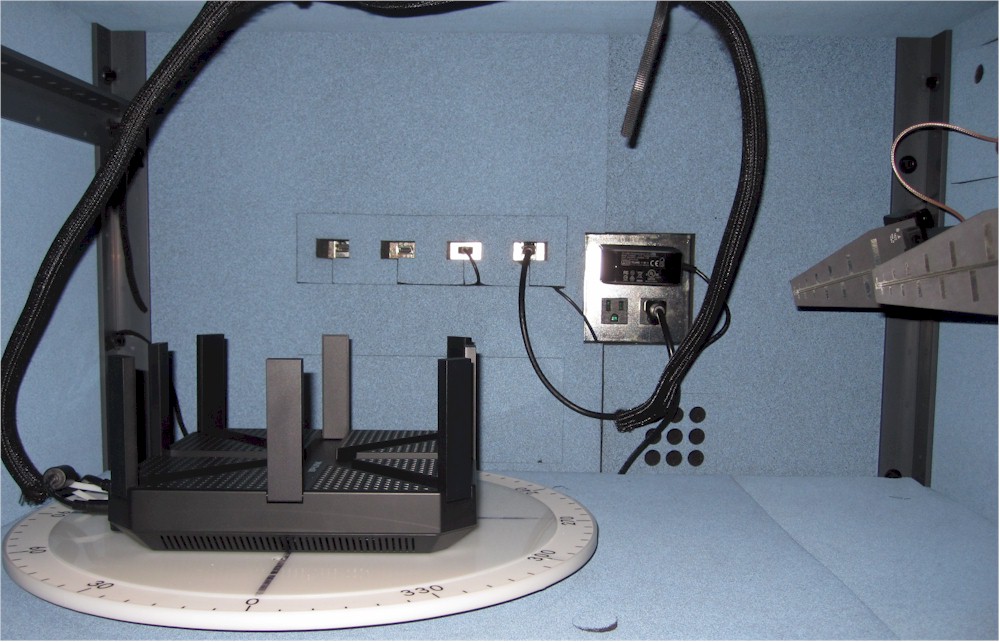
TP-LINK Talon AD7200 in test chamber
The AD7200 is the only AD7200 class router that exists. But since it is a 4×4 router at its core, I compared it to the ASUS RT-AC88U, TP-LINK Archer C3150 and NETGEAR R7800. It’s fair to mix AC2600 and AC3150 class products for comparing these benchmarks, because the Intel 8260 2×2 test client pays no attention to the non-standard 1024 QAM modulation responsible for the difference between AC2600 and AC3150 classes.
The average 2.4 GHz throughput over all points measured is better on downlink (76 Mbps) than uplink (61 Mbps). But the AD7200’s average downlink is about 10 Mbps lower than the ASUS in this comparison.
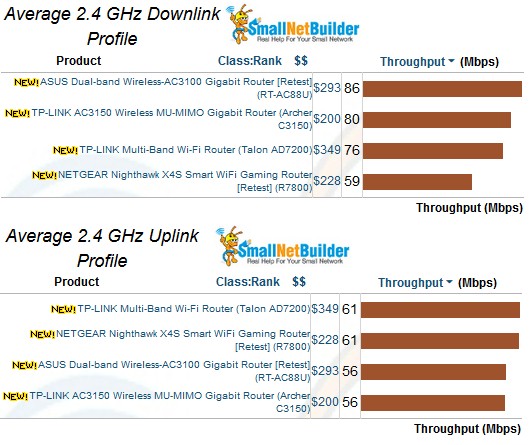
2.4 GHz average throughput comparison
5 GHz averages show downlink about twice as fast as uplink.
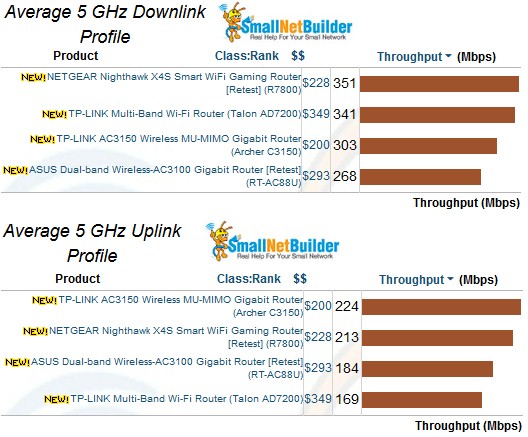
5 GHz average throughput comparison
Let’s dig into the throughput vs. attenuation plots for the details behind the averages. The 2.4 GHz downlink plot shows the AD7200 starting out high along with the ASUS and C3150. But throughput falls off more quickly, pushing total average throughput down.
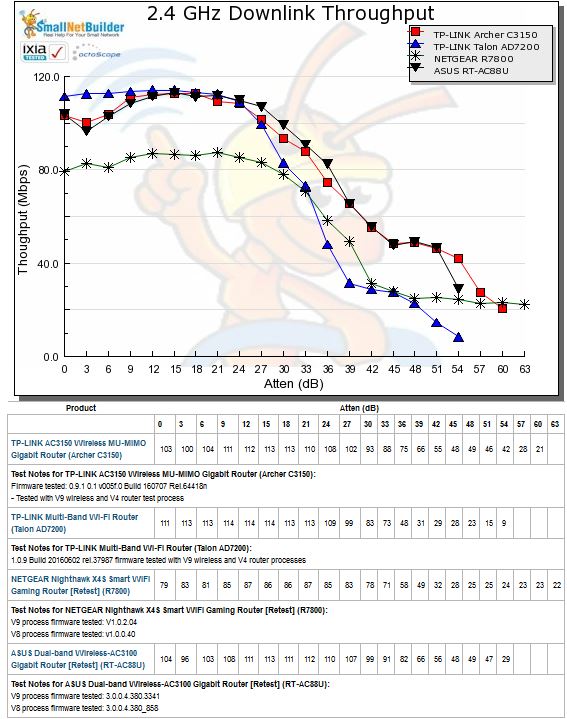
2.4 GHz Downlink Throughput vs. Attenuation
The AD7200’s quick throughput decline in 2.4 GHz uplink and relatively early disconnection after 51 dB attenuation result in average lower throughput.
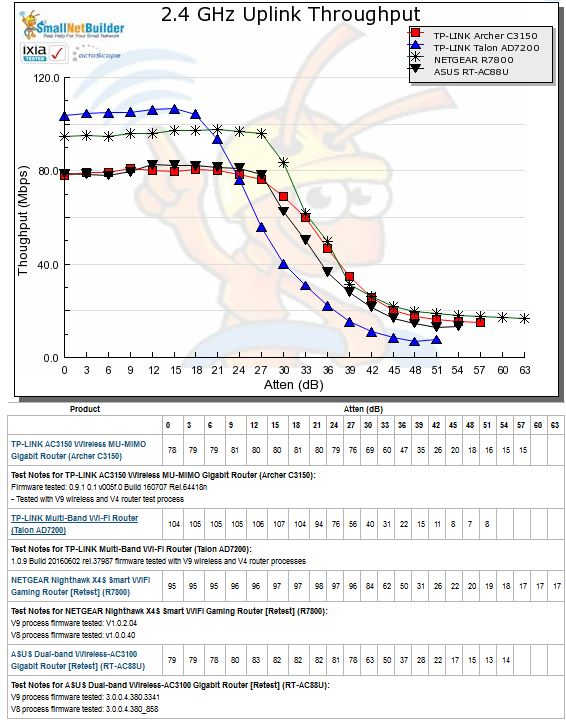
2.4 GHz Uplink Throughput vs. Attenuation
The 5 GHz downlink plot shows the AD7200 tracking the NETGEAR R7800 from the 18 dB test on. All compared products are more alike than different for this benchmark.
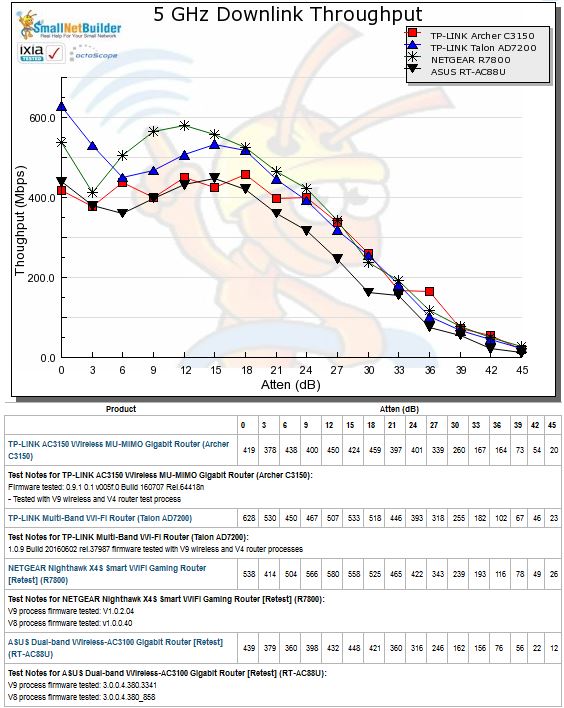
5 GHz Downlink Throughput vs. Attenuation
The more alike than different theme also occurs for 5 GHz uplink. However, since the AD7200 tracks below the other products for most of the tests, its average throughput is lower.
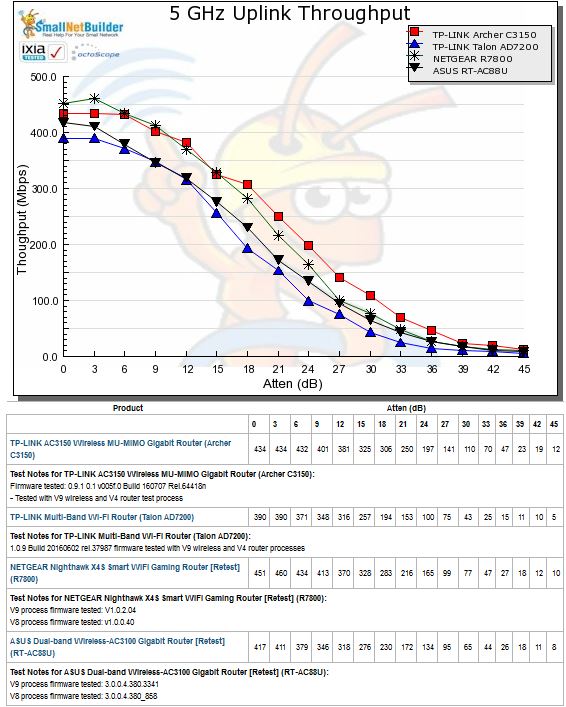
5 GHz Uplink Throughput vs. Attenuation
Maximum Wireless Throughput
Since throughput vs. attenuation plots are now done with a 2×2 STA, we use the Ixia Veriwave that can emulate up to 4×4 ac devices to test maximum throughput. The results posted are an average of 10 one minute test runs. This benchmark is fully described in the Revision 9 test process description. We’re again comparing the AD7200 with the same other 4×4 products. Keep in mind we use 40 MHz bandwidth in 2.4 GHz for this test.
2.4 GHz results show the AD7200 tied with the NETGEAR R7800 at 425 Mbps for downlink throughput. The two products move further apart for uplink, but both end up higher than the ASUS and Archer C3150.
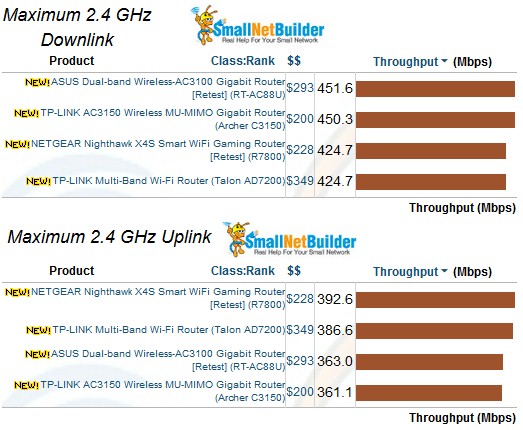
Maximum Wireless Throughput comparison – 2.4 GHz
The AD7200 and NETGEAR continue to rank #1 and 2 in the 5 GHz maximum comparison, trading places between downlink and uplink tests. It’s worth noting both products were able to link at their maximum MCS rates for both bands. The ASUS would link only at MCS7 (1300 Mbps) and the Archer C3150 only at MCS8 (1560 Mbps) in their 5 GHz tests.
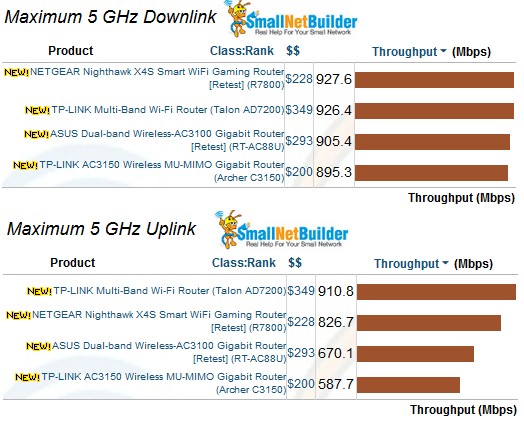
Maximum Wireless Throughput comparison – 5 GHz
Why No Router Ranking?
With the major changes to our router test methodology, the ranking criteria also must change. Unfortunately, the current version of the Ranker supports only one set of ranking criteria per product class. We’re hard at work on a completely revamped Charts system that will support multiple sets of ranking criteria and test data that will make everything right again. Please bear with us in the meantime.
60 GHz (802.11ad) Performance
Devices supporting 802.11ad are even harder to find than those supporting MU-MIMO. Fortunately, TP-LINK sent one of the few devices that does–an Acer TravelMate TMP446-M-77QP notebook. It’s part of Acer’s TravelMate P4 line, sporting a 2.4 GHz Intel Core i7-5500U processor, 8 GB of DDR3 RAM and a Qualcomm Atheros "Sparrow" 802.11ad adapter (at least that’s how it is identified in Windows properties).
Getting the AD7200 and the Acer notebook linked up using 802.11ad was just like setting up a Wi-Fi connection. TP-LINK defaults the AD7200 to a unique SSID for each band, so all three appeared when the Wi-Fi network icon in the Windows Notification area is clicked on. Entering the WPA2 key when prompted set the connection right up.
I was not surprised to not see the advertised 4.6 Gbps maximum link rate for the connection, even with notebook and router four feet apart. The most I saw was 3.8 Gbps during a drag-and-drop transfer, shown in the screenshot below. This was transferring the same ripped-DVD folder used for all filecopy testing, which contains a combination of 1 GB VOB and other smaller files.
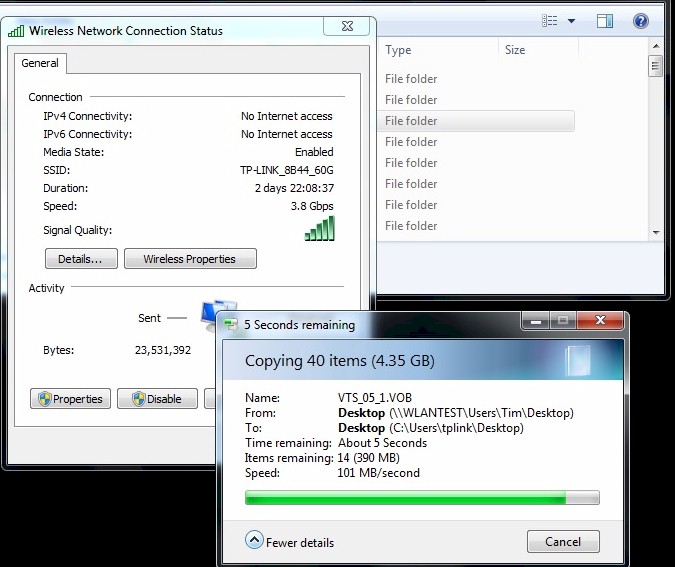
802.11ad in action
The 101 MB/s shown in the file transfer window might be a surprise, given the 3.8 Gbps link rate. But it turns out the internal architecture of the AD7200 limits any single connection to 1 Gbps (125 MB/s). Since the 11ad radio connects via PCI-e, the bandwidth bottleneck isn’t there. An obvious pinch point is that link aggregation is not supported on any of the switch ports.
To work around this limitation, TP-LINK’s reviewer’s guide suggested testing 11ad throughput using a computer connected to the router WAN port, another connected to a LAN port and one 5 GHz wireless client. I decided to start with two Ethernet connections to the AD7200’s LAN ports and see where that took me.
I used the Veriwave test set WBE1604 Ethernet WaveBlade, which is capable of supporting full-duplex Gigabit Ethernet connections simultaneously on all its four ports. Two ports were set to send TCP/IP traffic at full line rate, through the AD7200’s LAN ports. On the wireless side, I installed Veriwave’s WaveAgent app on the Acer laptop, running multiple instances to link up with the separate traffic streams sent from the Ethernet blade. The AD7200 and Acer laptop were about 4 feet apart as shown in the photo below, taken in the luxurious SmallNetBuilder back test lab.
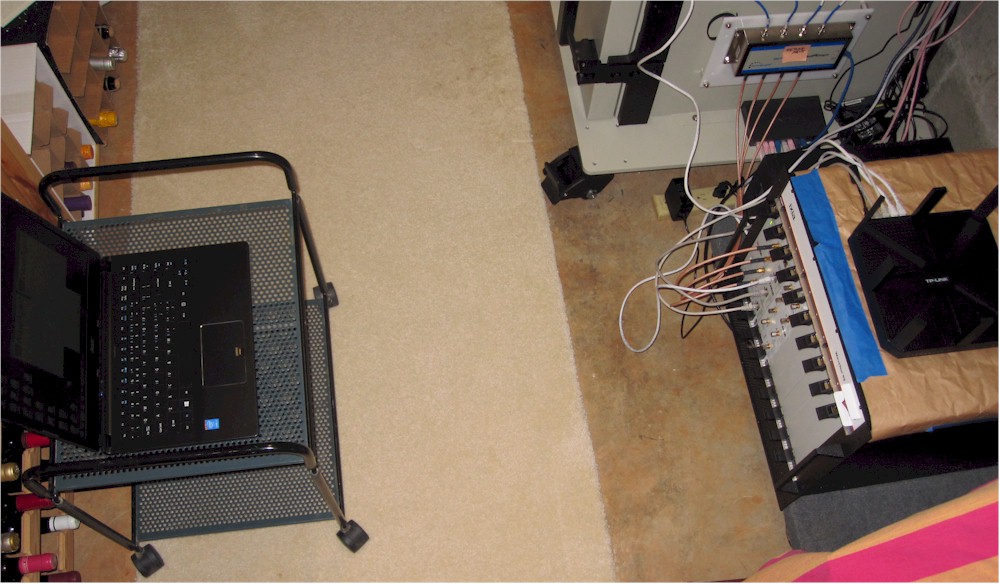
802.11ad test setup
The plot below shows total TCP/IP throughput measured with the combinations of transmit (TX) and receive (RX) connections shown. Transmit flow is from Ethernet to Wireless, receive is the opposite.
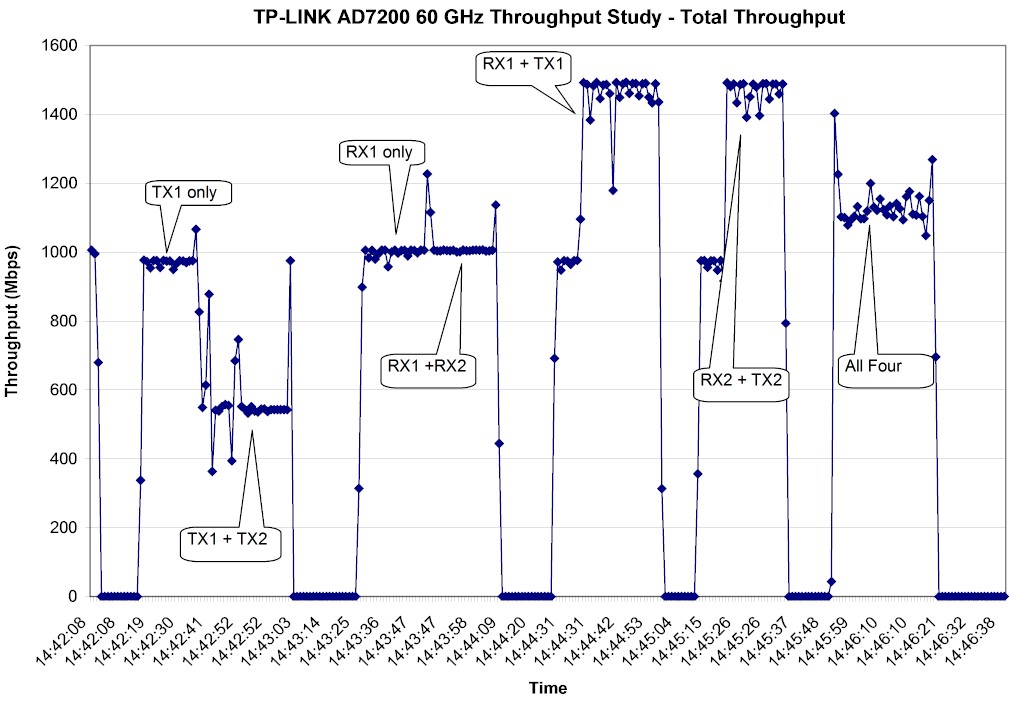
60 GHz throughput test – Total Throughput
Observations:
- Unidirectional throughput is a solid 1 Gbps using a single connection, receive or transmit
- Best case throughput of around 1.5 Gbps is obtained using the full-duplex capability of a single Gigabit Ethernet connection.
- Worst throughput occurs with two transmit connections
The plot below shows the individual connections.
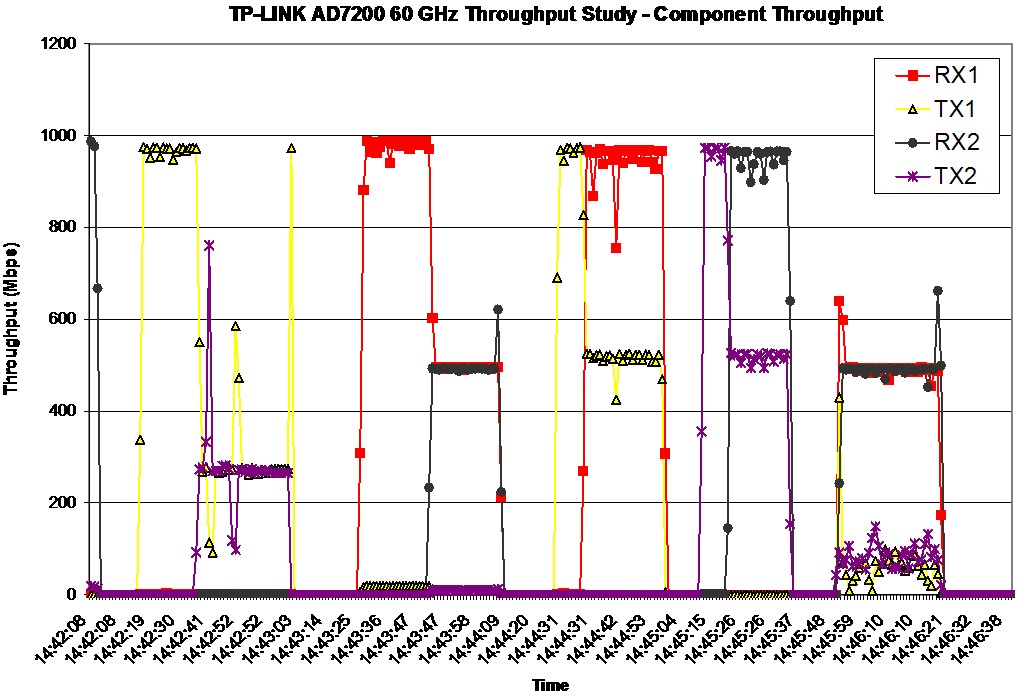
60 GHz throughput test – Component Throughput
I also ran a quick check, adding a third Ethernet channel to the router’s WAN port. Total throughput was actually a bit lower, around 1.3 Gbps. If the WAN port truly had a separate Gigabit path to the 11ad radio, I would have expected to see total throughput rise to at least 2 Gbps.
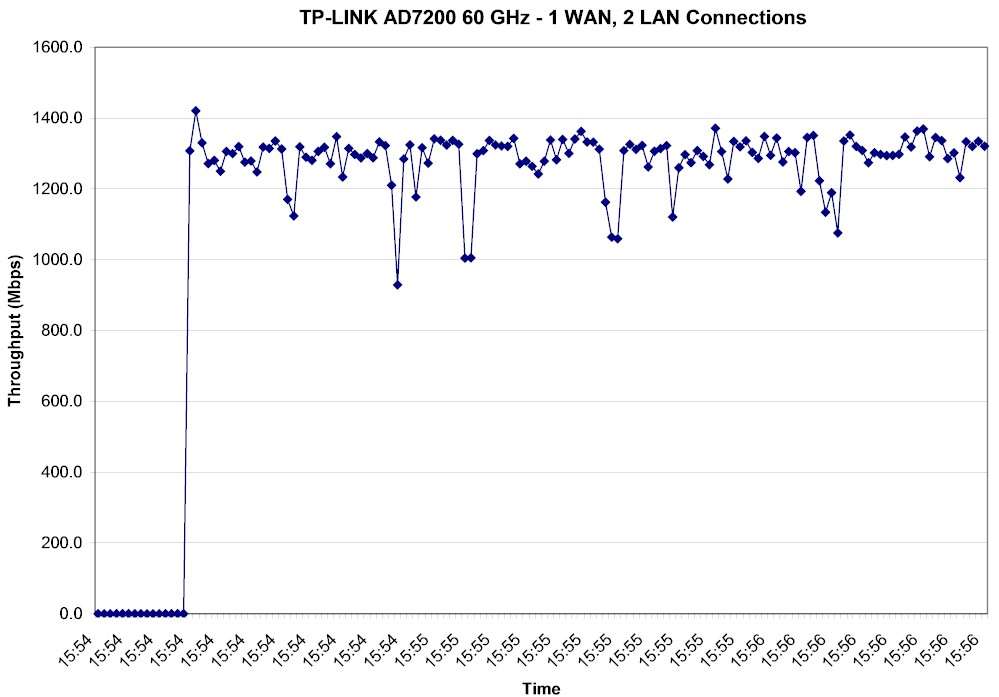
60 GHz throughput test – Total Throughput – 1 WAN, 2 LAN connections
The takeaway is that despite the 4.6 Gbps link rate bandied about for the AD7200’s 802.11ad connection, you’ll be getting only the equivalent of a Gigabit Ethernet connection.
How far will that connection reach? Not very. Putting myself between the router and and Acer laptop dropped throughput to close enough to zero, as did putting one sheetrock wall between the laptop and router. I was surprised to be able to walk the laptop out of the room and down the hallway a few feet without the connection dropping. But moving a few feet more did the deed.
MU-MIMO Performance
Since the AD7200 is at its core an Archer C2600, it also supports MU-MIMO. But like its sibling, it doesn’t support it very well. I ran our standard MU-MIMO test process using the Ixia Veriwave system. The Veriwave requires cabled connection to the router under test’s radios, so I had to open the AD7200 and use pigtails to connect to the 5 GHz radio U.FL connectors.
Since the AD7200 is a 4×4 MU-MIMO router, it’s fair to compare it to other 4×4 routers with working MU-MIMO, most of which are AC2600 class. The AD7200 doesn’t do very well for average MU-MIMO throughput, managing only 331 Mbps over the test, which uses from one to 16 devices. This is well below the best performer, NETGEAR’s R7800 Nighthawk X4S.
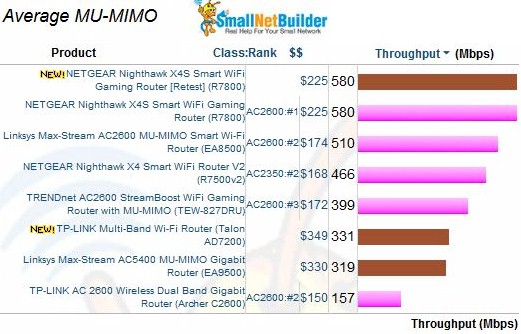
MU-MIMO Average Throughput comparison
The MU, SU Throughput Difference graph lets you quickly zero in on products with better MU-MIMO throughput gain. The AD7200 clearly doesn’t do very well, managing only a 15 Mbps average throughput gain.
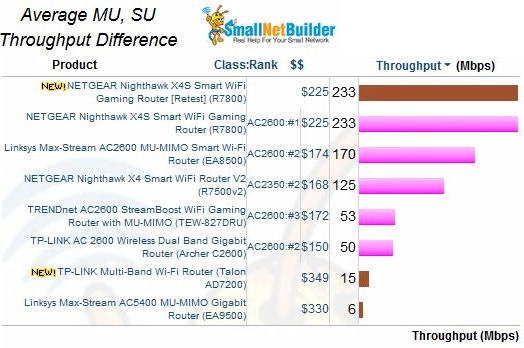
Average MU, SU Throughput difference
The MU, SU Difference vs. STA plot provides a look at the difference between MU and SU total throughput for each benchmark in the test. The NETGEAR R7800 is the clear winner here, providing throughput gain in all cases for up to 16 simultaneous devices tested, with 453 Mbps maximum gain with three devices. In contrast, the AD7200’s peak throughput gain was only 181 Mbps with two devices, dropping to -4 Mbps with three devices. The rest of the test run showed moderate gain for six and 11 simultaneous devices and essentially no gain or a loss for the other points.
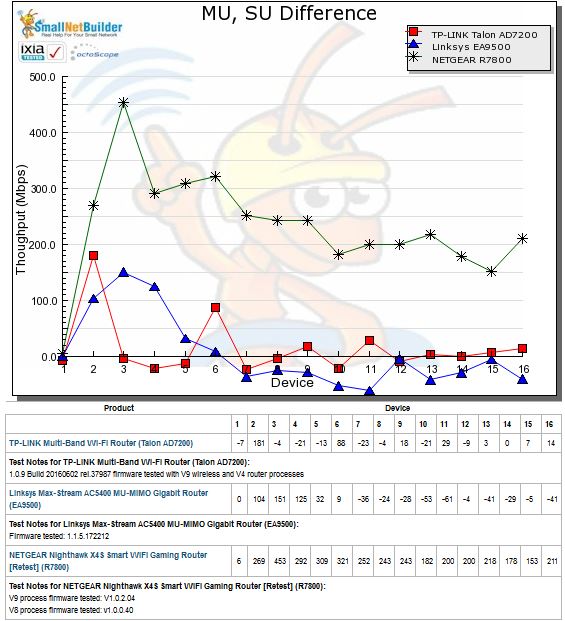
MU, SU Throughput difference
In all, like the Archer C2600, the Talon AD7200 isn’t a strong MU-MIMO performer.
Closing Thoughts
Over the past few years, TP-LINK has been steadily transitioning from a lesser known manufacturer of value-focused (cheap) networking products, aiming to take its place beside more well-known and respected brands. To advance that effort, I think TP-LINK pushed the Talon AD7200 to market primarily to claim bragging rights to having the first router to support 802.11ad and try to polish its cred as a Wi-Fi technology leader.
Be that as it may, I have to give TP-LINK credit for shipping a new technology that actually works. Not 802.11ad "ready" and waiting for a firmware update that never comes. But real, working product, if you’re willing to part with the $800+ for an Acer 802.11ad equipped notebook to use it with and be satisfied with Gigabit throughput for practical file transfer use.
Most of us, however, will experience the Talon AD7200 as an AC2600 class 4×4 router with competitive 2.4 and 5 GHz Wi-Fi performance (albeit a little range-challenged on 2.4 GHz), weak storage sharing performance and not the best MU-MIMO performance. And pay over twice as much in many cases for the alleged future-proofing the AD7200 provides over an AC2600 or AC3100 router. (You can currently pick up an Archer C2600 for $150.)
The draw for most uninformed shoppers will be that bigger ol’ number on the box, touted as "with up to 7200 Mbps with Multi-Band". But TP-LINK doesn’t go out of its way to inform prospective buyers that the biggest contributor to that inflated number (4600 Mbps) is in-room only technology. In fact, let’s see if you can find the information in this clip from the AD7200’s product page.

Can you find the 60 GHz range disclaimer?
Or how about this clip from the product datasheet?
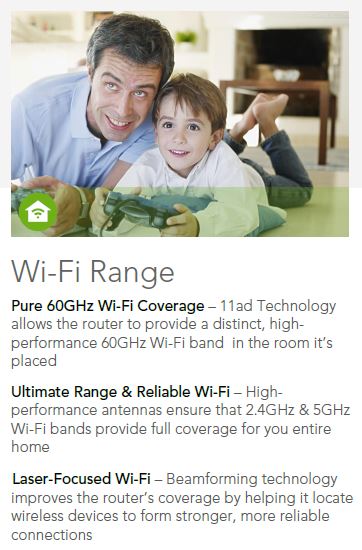
How about here?
Wi-Fi marketeers have been skating on thin ice for awhile with the "speed" number game they’ve used as their primary marketing tool. Disclaimers are usually asterisked and buried deep in small print on data sheets and product boxes. And no one tells you that you get the advertised super-fast speeds only with devices that don’t really exist, except usually in the form of the same router used as a wireless bridge. But I think TP-LINK needs to do a much better job of making the limitations of 802.11ad clear and informing buyers of what they need to actually use the technology.
So kudos again to TP-LINK for shipping the world’s first router supporting 802.11ad. Just don’t think for a second that the Talon AD7200 will future-proof your Wi-Fi any more than a much less expensive AC2600 router.
